Hong Kong International Airport cancelled all flights Monday in response to a flood of thousands of protesters staging a sit-in at the facility, demanding justice for pro-democracy activists and bystanders subject to violence by police and pro-China mobs throughout the city.
The cancellations affected more than 100 flights, many coming in from around the world. Authorities announced they expect flights will resume at 6 a.m. local time on Tuesday. Some flights were forced to turn around midflight after the cancellation.
Hong Kong police estimated that over 5,000 protesters swarmed the airport, though protesters have accused police of understating protest numbers in the past to make the pro-democracy movement seem smaller.
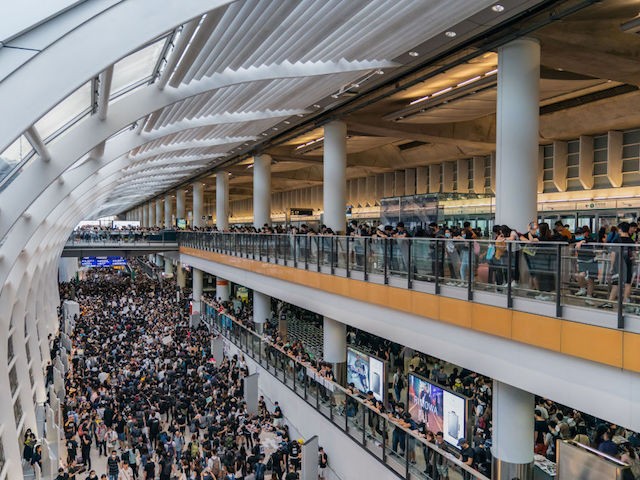
Protesters occupy the Hong Kong International Airport during a demonstration on August 12, 2019, in Hong Kong. (Billy H.C. Kwok/Getty Images)
Protesters waved signs urging foreign visitors to learn about the authoritarian state of the city and demanding justice for a woman believed to have been shot in the eye with a bean bag projectile, used by police to subdue crowds. Shocking photos of paramedics tending to the woman circulated on social media widely on Sunday night, showing her face bloodied and bandaged. Reports from paramedics who took her to the hospital say the woman has undergone hours of surgery to repair her face and will likely lose her right eye.
Protesters at the airport held signs reading “an eye for an eye,” “dirty cops return her eye,” and many wore eyepatches in solidarity. Others made eyes out of paper plates and construction paper and waved them around.
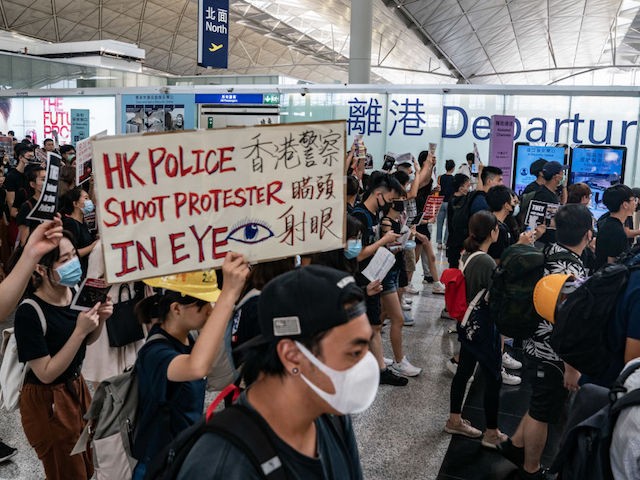
Protesters occupy the departure hall of the Hong Kong International Airport during a demonstration on August 12, 2019, in Hong Kong. (Anthony Kwan/Getty Images)
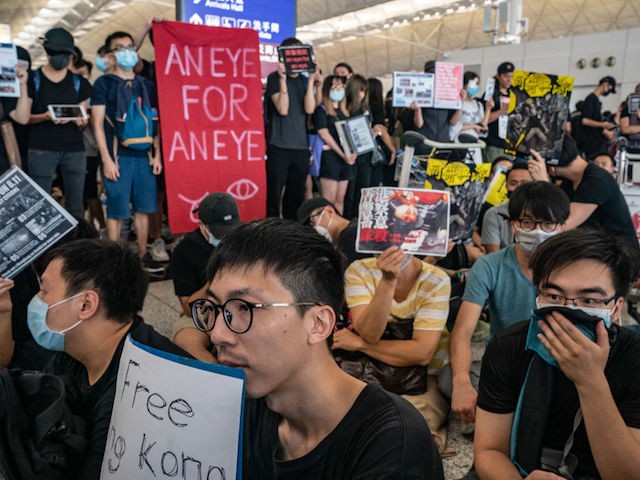
Protesters occupy the departure hall of the Hong Kong International Airport during a demonstration on August 12, 2019, in Hong Kong. (Anthony Kwan/Getty Images)
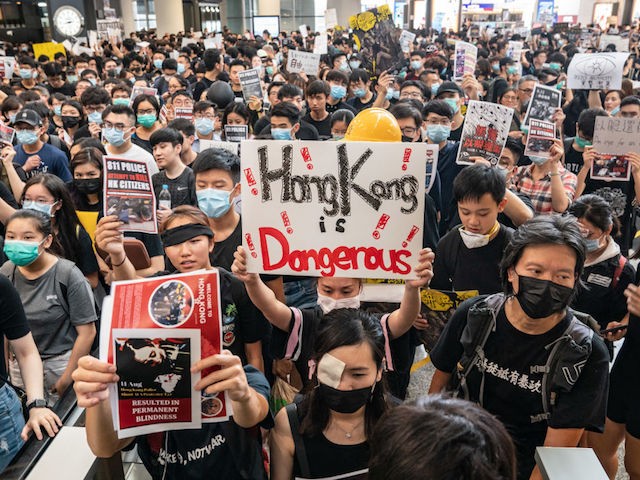
Protesters occupy the arrival hall of the Hong Kong International Airport during a demonstration on August 12, 2019, in Hong Kong. (Anthony Kwan/Getty Images)
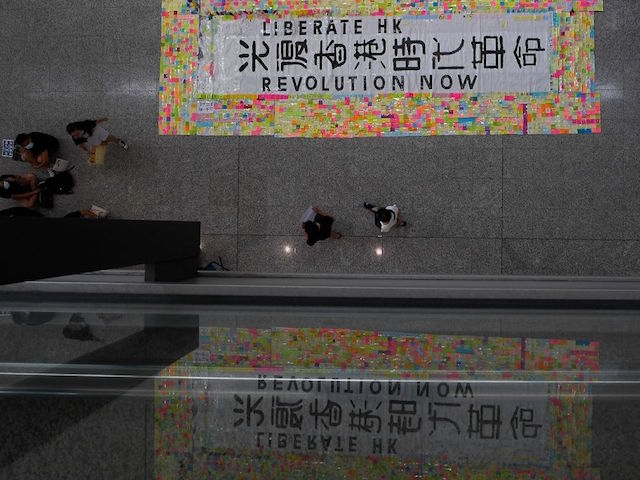
People walk past messages against the controversial extradition bill at Hong Kong’s international airport on August 11, 2019. (MANAN VATSYAYANA/AFP/Getty Images)
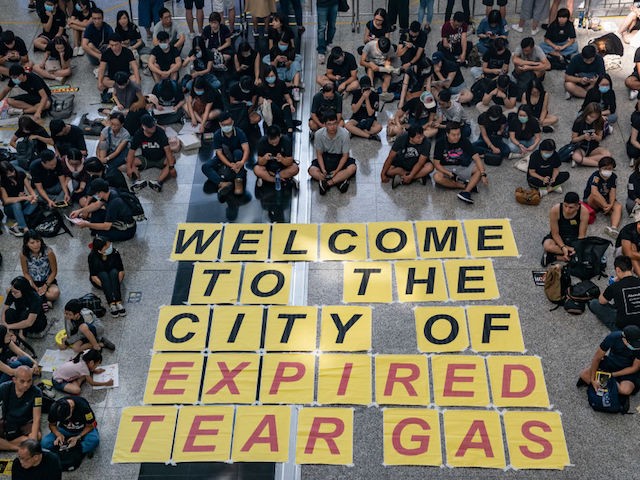
Protesters occupy the arrival hall of the Hong Kong International Airport during a demonstration on August 11, 2019 in Hong Kong. (Anthony Kwan/Getty Images)
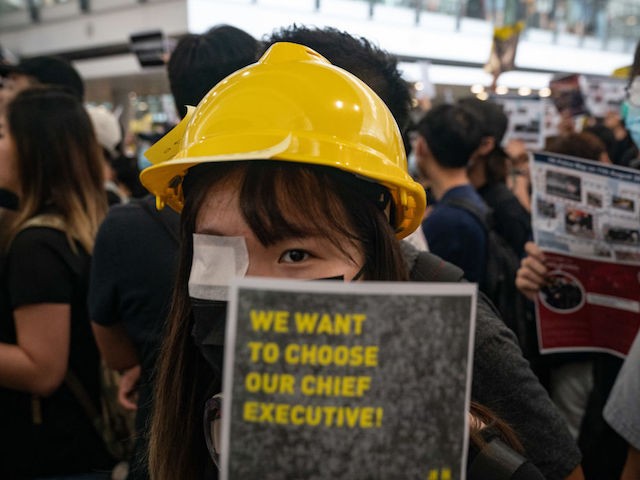
A protester holds a placard as she occupies the arrival hall of the Hong Kong International Airport during a demonstration on August 12, 2019, in Hong Kong. (Anthony Kwan/Getty Images)
While Monday’s was the largest and most disruptive protest at the airport since the protests began in early June, protesters have been staging sit-ins at the airport for days, leaving pamphlets explaining the protest movement to visitors and urging police to cease violently attacking dissidents. Outside of the airport, police have escalated their use of tear gas – on several occasions this weekend, shooting tear gas into enclosed Mass Transit Rail (MTR) underground stations – and using projectiles such as bean bags and rubber bullets on protesters. The airport has become a more attractive spot to protest since police cannot use tear gas there without a reasonable chance of injuring travelers unrelated to the protest movement.
Following the protests on Monday evening, local time, many of the thousands protesting made their way out of the airport in an orderly fashion.
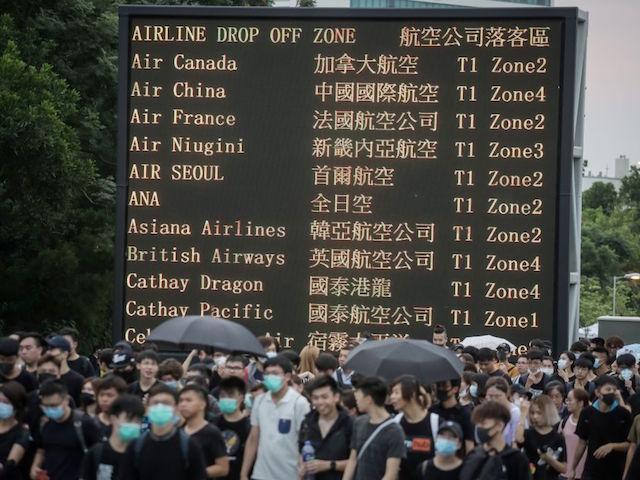
Protesters walk on a highway near Hong Kong’s international airport following a protest against the police brutality and the controversial extradition bill on August 12, 2019. (VIVEK PRAKASH/AFP/Getty Images)
Monday’s airport protest is an escalation of a similar tactic used last week. A Monday ago, protesters called for a general strike, urging those who support their call for universal suffrage to take the day off. An estimated half a million people heeded the call, nearly shutting down the MTR entirely and forcing hundreds of flight cancellations at the airport, as pilots and key flight staff also called out of work.
In an attempt to keep the situation from continuing, the Hong Kong airline Cathay Pacific issued a warning Monday that it would fire employees if they “support or participate in illegal protests.”
“Cathay Pacific Group has a zero tolerance approach to illegal activities. Specifically, in the current context, there will be disciplinary consequences for employees who support or participate in illegal protests,” Cathay Pacific chief executive Rupert Hogg wrote in a general memorandum to staffers. “These consequences could be serious and may include termination of employment.”
The Global Times, a Chinese government propaganda outlet, published a story Sunday threatening Cathay Pacific, warning that Beijing may ban the airline from communist China.
“If the airline cannot guarantee compliance with the new regulatory demands on flight safety, its flights cannot be allowed to fly to or over the mainland. It will also have to face the snub of mainland passengers,” the Times wrote, accusing 2,000 airline employees of participating in the general strike.
“Some Cathay Pacific employees have shown extreme political inclinations and bluntly defied the rule of law. The company’s safety controls have been greatly disrupted by political factors. Whether it can ensure the highest standard of flight safety and services quality in the future has become unknown,” the Global Times posited.
The Hong Kong protest movement took off in early June, a response to the Legislative Council (LegCo) attempting to pass a law that would allow China to extradite anyone present in Hong Kong if accused of violating Chinese Communist Party laws. Under the “One Country, Two Systems” policy, China cannot impose communist law on Hong Kong, a rule the extradition bill would break. Protesters are demanding a full withdrawal of the extradition bill in addition to four other concessions: free election of all Hong Kong lawmakers, an independent inquiry into police brutality, freedom for political prisoners, and a declaration that the government was wrong to call the protest that occurred on June 12 a “riot.”
The Chinese Communist regime has refused to yield to the demands and claims, despite evidence, that the peaceful pro-democracy movement is a violent “terrorist” plot orchestrated by the United States.
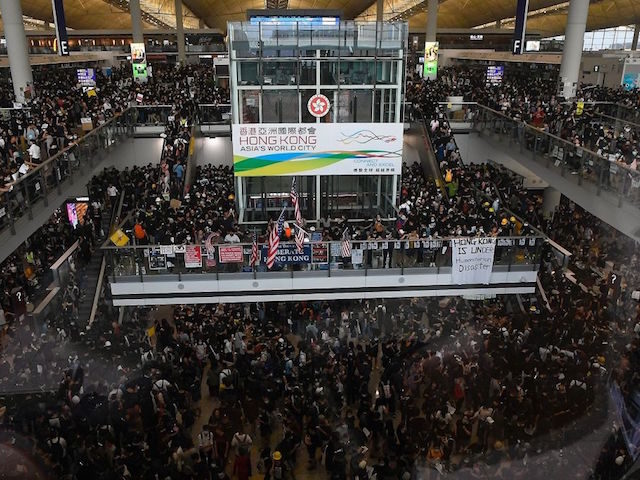
COMMENTS
Please let us know if you're having issues with commenting.